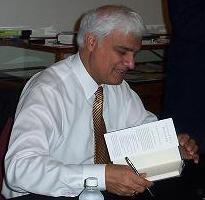 I’ve been asked a number of times lately why I disagree with Ravi Zacharias and why I bristle at the thought of his ministry. I’ve been familiar with Ravi for many years, since my days assisting with the pastorate of an on-campus Christian and Missionary Alliance church at Penn State, the denomination in which Ravi is ordained. He is an apologist who speaks for the Christian faith: but who specifically regards queer people as unworthy of a calling within the church. I originally wrote something on the topic several years ago (Bowles, 2012): not even addressing my difficulty directly, but instead arguing that since “nothing in unclean” (Romans 14:14) in the world of faith, homosexuality should not, of itself, be seen as wrong. It turns out that the youtube video I quoted in that piece has been taken down, due to “copyright violations” of RZIM, but I’m looking for a replacement.
I’ve been asked a number of times lately why I disagree with Ravi Zacharias and why I bristle at the thought of his ministry. I’ve been familiar with Ravi for many years, since my days assisting with the pastorate of an on-campus Christian and Missionary Alliance church at Penn State, the denomination in which Ravi is ordained. He is an apologist who speaks for the Christian faith: but who specifically regards queer people as unworthy of a calling within the church. I originally wrote something on the topic several years ago (Bowles, 2012): not even addressing my difficulty directly, but instead arguing that since “nothing in unclean” (Romans 14:14) in the world of faith, homosexuality should not, of itself, be seen as wrong. It turns out that the youtube video I quoted in that piece has been taken down, due to “copyright violations” of RZIM, but I’m looking for a replacement.
However, the video that I referenced was a bit dated and people can change. At least they can change their outward rhetoric (which is what Ravi does quite well) or they can change their inward opinion. Ravi speaks a lot these days about loving homosexuals and yet “affirming the belief that marriage should remain between one man and one woman” (Gospel Herald Society, 2015). So he wants to love homosexuals… as long as we aren’t being a pain. As long as we are not intruding where we’re not wanted. As long as we keep to our own side of the dividing line in church. That might be the kind of love that Ravi can offer, but it does not sound like what Jesus commanded two thousand years ago.
In the above article, Ravi refers to same-sex marriage as follows:
Sexual intimacy outside of outside of [sic] a monogamous, heterosexual marriage, leads to the “emptying of essential purpose and meaning [which]…leads to the loss of essential purpose in life itself,” Zacharias warns. “This is why it is vacuous to say that if two people love each other they may express it in any way they choose,” he continues. “Love is not defined in a way that is self-referencing. It ultimately hangs on the peg of God’s love and how He defines love.”
That’s my marriage he’s speaking of.
I’ve been married twice in my life: once to my ex-wife, and once to my current husband. I just passed our ninth anniversary in my relationship with the latter. The idea that just because he’s my husband our marriage has to be “vacuous”, “empty”, “self-referencing” and without purpose is monumentally insulting. My first marriage was to a wonderful woman I met at Moody Bible Institute; we had counselling and teaching (I’ve even taught some of those) and we understood the Biblical perspective of what God had given us to express our affection for each other. Yet it didn’t work. Years later I left the States so that I could get married to my husband (my “self-referencing” marriage) and have our relationship recognized. There was no “same-sex” premarital counselling, but we did our best. In this sense I have a fairly unique sense of the how straight and gay marriages are different. And if you are going to refer to “empty” or “vacuous” marriages, I can think of a lot more that are straight than that are gay. Because it matters a lot less how you define marriage (and let’s face, such “definitions” are really just guesses) than on what you bring into it. I believe that my current marriage is at least as valid as my first: and, importantly, I have been blessed and grown and learned from my husband as much as I did from my wife.



